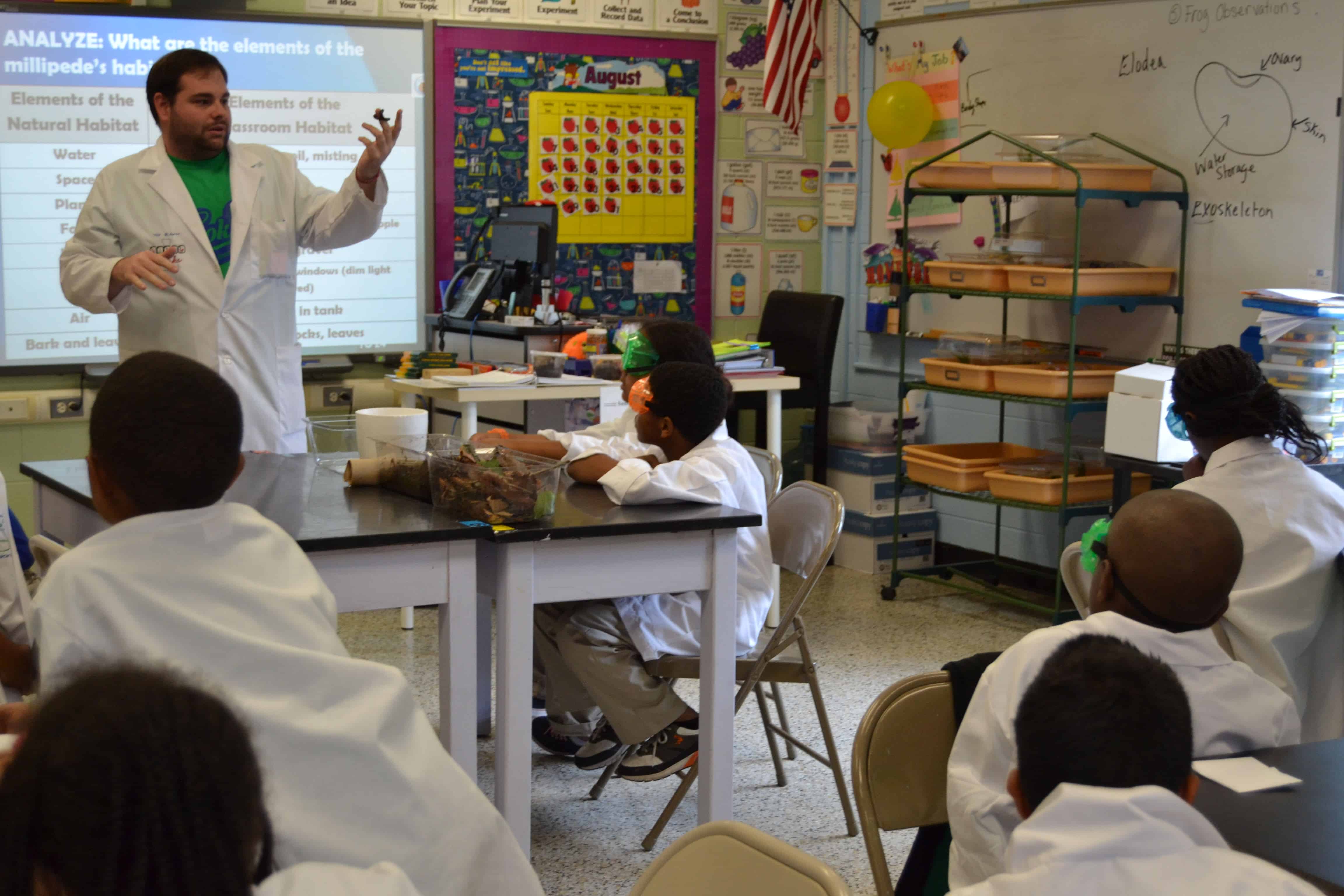I am a sixth grade teacher, and I am a novelty.
That was the insinuation a parent gave several years ago during an Open House meeting, emphasizing his child’s “worry” of having her first male teacher.
“She’s never had a male teacher, Mr. Price. So she will probably take a couple of weeks to warm up to you.”
That sentiment has appeared in various forms throughout my tenure as a classroom teacher.
North Carolina has an issue within their education system, and it is an issue that dates all the way back to as early as 1975. For 50 years, N.C. has remained stagnant in recruiting and incorporating men into the K-12 educational field. And that’s a problem.
Having men in education for our K-12 students is critical to the betterment of our students. The importance of male educators in the classroom has been one long discussed in dissertations, college classrooms, blogs, online articles, and other research groups over time.
Why Should We Care?
While teaching has statistically been a female-dominated job, that has not always been the case. In the days of ancient civilizations, men could receive an education, while women were not allowed to be the educators, leaving the position of teacher to the men.1 During colonial periods until the 19th century, men were also more commonly found as teachers. However, these positions were often utilized as a means to an end in order to obtain practice for clergy and law-based positions.2 It was not until around the time of the Industrial Revolution that our current concept of public education came about. Numerous reasons overtook the loss of men in education during this time frame, which meant that schools had to begin looking to an alternate labor force to contribute to the educational system, thus seeking out women.
A myriad of reasons can be laid to state why we should care about male educators being in the classroom. However, one particular aspect that is foundational to all other concerns in addressing why we should care about male teachers in the classroom: role models.
In 2014, according to the U.S. Census Bureau, approximately 50.1 million children (ages 5-18) were enrolled in a public school.3 In that same year, approximately 17.4 million children were claimed as being “without male spouse present.”4 This means that there are approximately 34.7%5 of children in our school systems are living without the presence or consistent presence of a father-figure.
This fact alone should be shocking enough to force us to realize the profound impact of having male role models in our schools for male and female students. Gender diversity does not only offer a different perspective in teaching, as racial diversity also does, but it offers an outlet for students to be exposed to basic life skills they otherwise lack from example in the home.
Mr. Behr is an Exceptional Children’s teacher at my school, and has worked as an EC Specialist for several decades in the public school system, between middle and high school grades. He once told me the story of a support group he used to offer at his school, as an alternative to In School Suspension, for students who were written up. This particular support group was focused on male emotional support. In his story, he told me of a student who had been written up by another male teacher for speaking inappropriately toward another teacher, who happened to be female. When confronting the student in this support group, Mr. Behr asked:
“James, didn’t anyone tell you that you shouldn’t speak to a woman in such manner?”
James’ response was simple: “No, I’ve never had anyone at home to tell me not to do that.”
It came as no surprise to me when Mr. Behr mentioned this child came from a fatherless home-life.
Providing examples that aren’t seen in home-life are not the only impact having a male teacher can provide. Provision of male educators can contribute to children’s social and intellectual development. “Contact with and observation of male teachers allows [students] to see that men can be…capable…in caring for and teaching [them]. Conversely, an absence of men in [schools] leaves children with the impression that men can not be involved in such work…”6
The Facts
But, I noticed a stark contrast in the number of times I heard said sentiment as an elementary school teacher, in comparison to when I moved to teaching 6th grade several years ago.
For fifty years, NC has remained at a standstill in the number of men it has outreached to join the labor force of education. Looking at the numbers in percentage, male educators in the Elementary Schools in NC remained within a range of roughly 9-10 percent over a fifty year period, starting in 1975. Did you catch that? No significant change in fifty years!
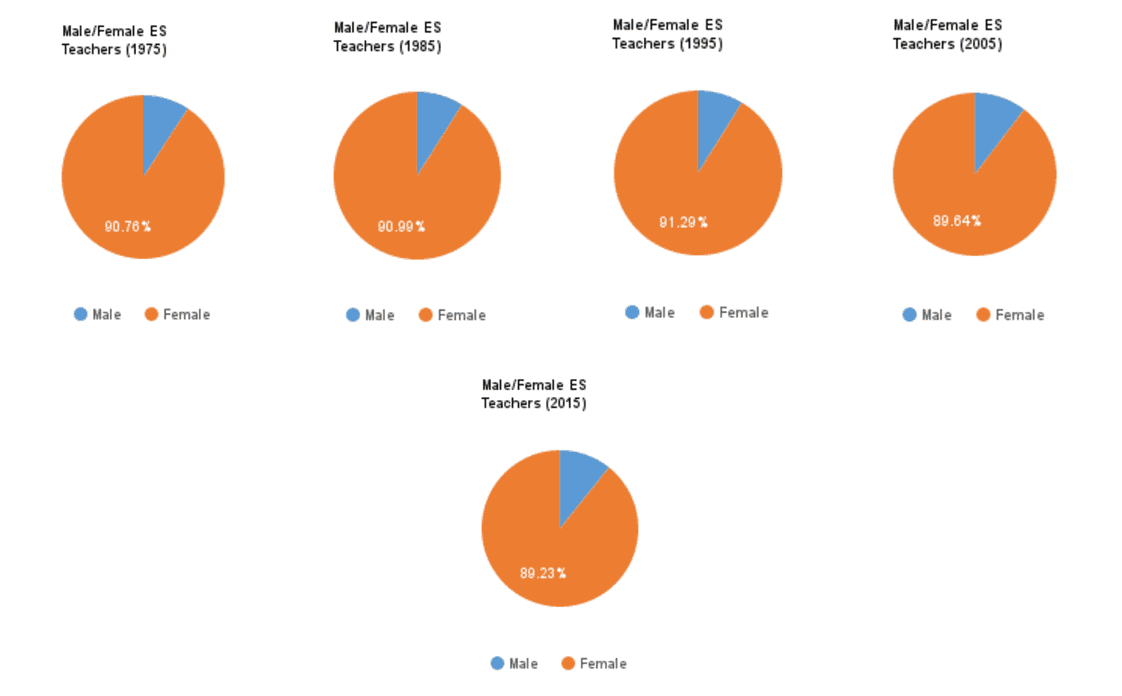
Secondary schools in N.C. have seen an almost 5 percent decline from 40 percent in male teachers since 1975.
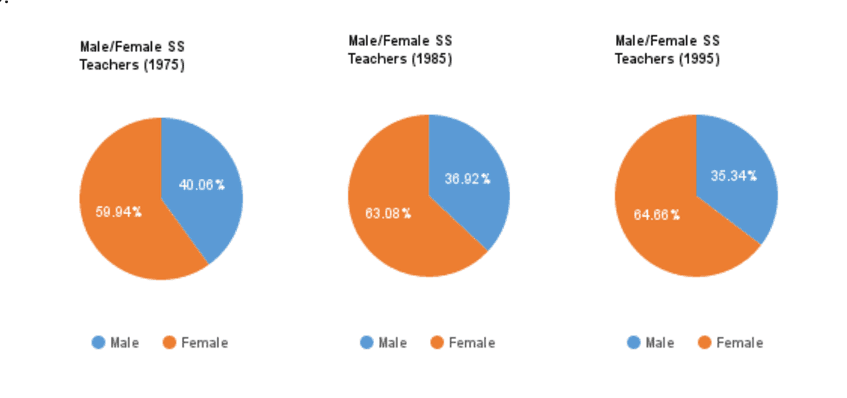
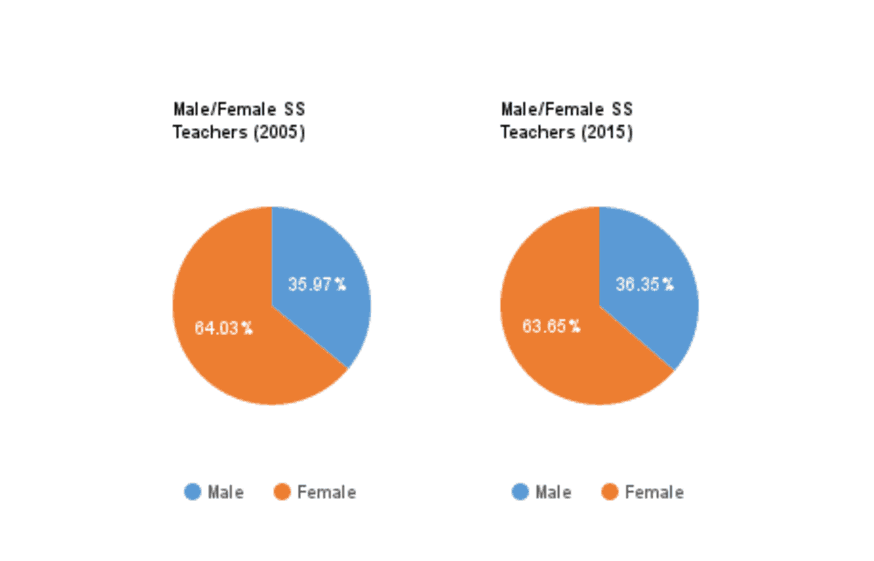
The category of “Other Schools,” which includes combined schools (K-8, 7-12, EC Specialty Schools) has remained in the 20th percentile over the course of fifty years.
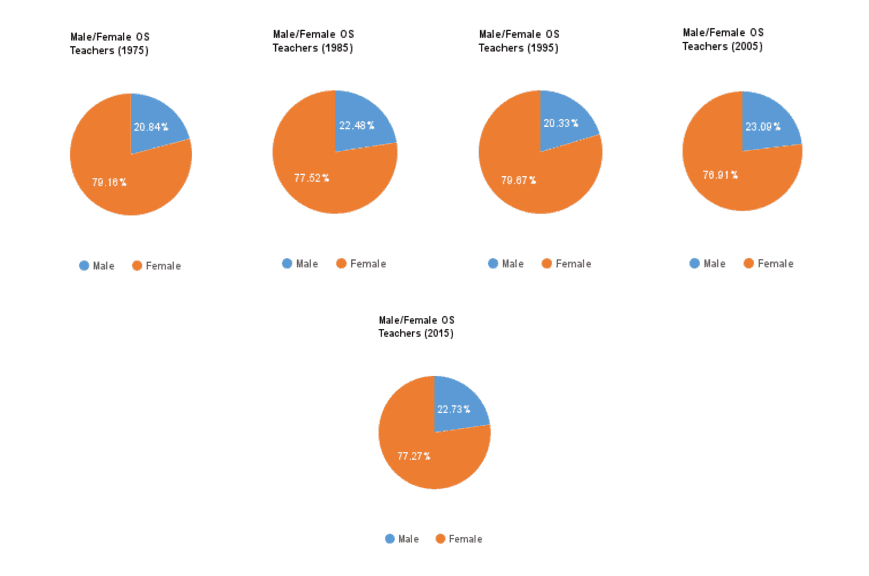
Hearing the stagnation of those numbers as ranges however, does not present the most accurate picture of men in our public schools when you consider what their average percentage is, over five decades:
- Elementary School Male Teachers: 9.61%
- Secondary School Male Teachers: 36.92%
- Other School Male Teachers: 21.89%
Underlying Causes
Certainly, dissertations and scholarly articles exist on answering the question of why men are not entering into the education field. Suggestions range from simple financial figures7, to emotional connection (or inability of8), to the perpetuating cycle that since men do not enter the profession, other men will not enter the profession.9 And these are thoughts from a national standpoint.
But the point of this article is to look even further into reasons that N.C. is experiencing these issues. When compared to the national statistics in 2015, N.C.’s numbers show our state to be behind:
|
SCHOOL CATEGORY |
NORTH CAROLINA |
NATIONAL10 |
|---|---|---|
|
Elementary School |
10.77% |
19.3% |
|
Secondary School |
36.35% |
40.8% |
|
Other School |
22.73% |
37.7% |
That the national average isn’t much better, but why is North Carolina behind in all three of these categories?
Lack of Respect/Disregard of Higher Degrees
Full disclosure: I never wanted to be a teacher. It was never a concept on my radar. But somehow, the very profession that I swore to myself I would never be in is the very one that I have become passionate for and have adored every minute of.
Growing up, I can remember very vividly how my parents and other adults around me would make comments that indicated teaching was not really the best profession to consider. It wasn’t that their comments were full of malice, but they weren’t loaded with adoration, either. Fast forward to my career as a classroom teacher now, and I have heard several of my sixth grade students swear to me that they will never become a teacher.
Remember the story of the student at the beginning of the article who claimed they “never want[ed] to be in a job where people didn’t have enough respect for [you].” I’d be lying if I told you that were not true. Teachers often take the brunt of disrespect from numerous individuals, ranging from angry parent emails inquiring why the child is failing their class, to becoming the political pawn in the legislators’ latest scheme to “better our education system.” All this, surrounded by 24/7 media coverage that simply reiterates these ideas, brings an aura of negativity and disrespect. It should be noted that this of disrespect has been observed at a local and state11 and national12 level.
Speaking in more nuanced tones, we cannot continue a discussion on respect without approaching the connection of pay to an individual’s assessment of themselves. Let me qualify that this discussion of pay is not subject only toward the amount of money that enters an individual’s bank account; “pay,” in the sense of the education setting, is also that which is being poured into our classrooms that outfit a learning environment. In N.C., this pay of educators and investment of their classrooms has, for lack of better terms, diminished, proving that while politicians claim to be in support of better education, little action has been accomplished on their end to suggest otherwise.13 As former U.S. Secretary of Education Arne Duncan stated,“Money is not the reason that people enter teaching. But it is a reason why some talented people avoid teaching–or quit the profession when starting a family or buying a home.”14
What were teachers supposed to believe in terms of respect when the NC General Assembly made the dastardly decision to abolish Masters pay for teachers in the classroom back in 2013?15 I, unlike many others, lucked out. I was a part of the final group of candidates who were grandfathered into receiving their Masters pay because my graduation happened only months before the new act went into effect. At the time, I had no child at home and was a part of a dual-income family.
Fast forward to today, where I remain part of a dual-income environment but now have a child to consider, I don’t quite know how or if our little family would be able to uphold themselves without my Masters pay having been acknowledged. Besides…what other job are you aware of where your Masters degree does not contribute in some small part toward your salary discussion?
Let me be clear: all individuals deserve respect. It is my life-long motto, and I hope I can continue to implore that through my actions both in and out of the classroom, regardless of gender. But we must understand that this concept of respect based on gender is most prevalent and stereotyped in the south, including N.C. and something that typically men often elevate as more important for their emotional well-being than women.16, 17 That then begs the question: why would men, particularly in the south, run toward a profession that they know is not going to provide them with the respect they desire?
Not A Career Pathway
When I eventually chose to enter the teaching profession, no one outlined for me all that could be offered by way of a career pathway. Naturally speaking, most individuals look into the teaching profession as a means to gain principalship, or a higher administration role; but there is far more that can be offered, as I have experienced.
So why are we not doing enough to outline the options of career pathways through teaching? Many people assume that there are two careers in the classroom: remain in the classroom, or become an administrator. Many individuals don’t recognize or acknowledge the opportunities beyond the classroom: curriculum coordinator, testing and data analysis, lead consultant, etc. The problem is that Education stakeholders have downplayed the importance of serving time in the classroom, and using the classroom as an incubator to preen and groom teachers into becoming lifelong educators at different levels.
Instead, we have disrespected the role of the classroom teacher, and thus encouraged individuals to skip this step altogether, and jump right into other educational roles without the joy of being in the classroom. Because of the long-standing pay issues in N.C., most teachers are forced to look beyond the classroom for career advancement. The issue here, again, is that there is nothing that points directly to an expert and vibrant teacher remaining in the classroom. Sure, the teacher could obtain their National Board’s which, on average, provides a 12.5% pay raise in a teachers salary. But this is an unsustainable means to encourage great teachers to remain in their classrooms and continue positively affecting students and colleagues alike. Unsustainable, in that the increase in pay is a one-step process that does not encourage anything to go above and beyond after; nor further compensation. I could obtain quality fellowships like that of the Kenan Fellowship Program or Hope Street Group: N.C. Teacher Voice Network. But what else exists to encourage me to stay in my role as the classroom expert.
Lack of Recruiting/Death of Teaching Fellows
In addition to not creating a narrative of achievable career pathways beyond the classroom, there has been a significant lack of recruitment efforts on the behest of the universities in North Carolina. Upon my reaching out to ten of North Carolina’s most prominent teacher prep universities, none of the recruiters indicated any intentional dialogue or outreach that targeted young promising men whose character and personality and passion might fit well in a classroom setting.
Beyond this lack of recruitment techniques lies a heavier problem, which ties into the recruitment outline: death of the NC Teaching Fellows Program (NCTFP). The appeal of NCTFP was the idea that one’s undergraduate schooling could be fully funded, so long as the individual receiving the scholarship agreed to serve five years in a public school, following graduation. Now, individuals must seek out other scholarships, often ones that are in competing departments or are nationally endowed, making the odds of becoming a recipient greater.
Without the existence of intentional programs built to support individuals seeking their bachelor’s degree in education, and without the intentional dialogue to recruit individuals into the classroom, our chances of gaining more males in the classroom continue to dry up. Between 2010 and 2015, the number of individuals (male and female) entering into Bachelor and Master degree programs within the UNC System for K-12 education has declined 18 percent in enrollment18; more explicitly, men applying toward these programs have declined 26 percent in enrollment between 2010 and 2015.19 In the 2013 – 2014 school year of the UNC Systems, only approximately 18 percent of enrolled students in Undergraduate Education majors were male, while approximately 82 percent were female.20 In contrast that same year, approximately 21 percent enrolled in Master’s programs for Education were male, while approximately 79 percent were female.21
Where Do We Go From Here?
I hope we can acknowledge how we are choosing to show educators, regardless of gender, the respect they need to complete their jobs. While pay is not all that a job is about, it is a primary way to speak toward the respect that someone has for another person.
I hope we can consider how we might become more intentional in our outreach to men, especially young men choosing a directive for college, to come experience the joy of the classroom. We need more men in our classrooms to partner with our young students who still need the guidance in life that they can only receive from those in role-modeling positions. I hope we can become diligent in re-establishing programs that make learning the craft of the classroom more affordable and cost-effective.
So where do we go from here, beyond holding out hope?
To start, I suggest three major considerations that legislators and universities should heavily consider as we progress education forward in our state.
- Re-instate the North Carolina Teaching Fellows Program (Legislators)
Many people are unaware, but when the General Assembly voted to no longer fund the NCTFP, they still maintained another branch of a similar program: the Principal Fellows Program. Clearly, legislators see the intrinsic and extrinsic values of having fellowship programs such as these, otherwise they would have defunded both programs. In recent years, other states have enacted similar programs that were modeled after our very own fellowship program. Most recently, Indiana’s former Governor-now-Vice-President Mike Pence, with unanimous voting from both sides of the aisle, created the Next Generation Hoosier Educator Scholarship Program that will accomplish what the NCTFP once did.22 - Intentionally Recruit Males (Universities)
For the UNC System, there seems to be little to no intentional efforts being made to explicitly recruit males into the education field. To rectify this, the university system should first consider the framework in which they create the vision for their education programs, as well as the education field itself. Recruiters could partner with high school counselors in a meaningful way, by eliciting their help to pinpoint specific individuals whom they feel would be exceptional students in an education degree program, and the job field itself. - Set Up Male-to-Male Mentors (Universities)
Along with intentional recruiting, universities should seek to specifically partner future male educators within their programs to practicing male educators in the field. In my time of performing observations and student teaching, there was not one male educator that I had an opportunity to meet or see in action. This may take some intense front-work on the part of the universities since this is a female dominated field. But it should be the intent and explicit action taken to emphasize the need and the desire for more men to be in the classrooms. In turn, some suggest that partnerships like a mentoring program can reduce dropout rates from programs and universities, when done well.23 - Change the Tone of Voice (General Public)
Not everyone holds teaching in a negative light. I have been blessed beyond riches that I have parents and students who send me emails and other messages elaborating on how they appreciate my service and compassion toward their family. But this rhetoric is not commonplace. Teachers and their positions too often become the pawn in the game of the General Assembly and politics. Unfortunately, this contributes to the negative thought-process that general society has on teachers, their worth, and their value. Some local stations, like WRAL, do well with features like the “Teacher of the Week” to emphasize a positive light on educators. Moments like these are more like needles in a haystack, when held against the stereotypes faced on fictional programs (ex: TV Land’s Teachers). Just take a look at this handout used to sum up most common teacher stereotypes.24 We need less perceptions of the Trunchbull and more of Mr. Feeney in our midst. - Pinpoint the Future Teachers in Your Classroom (Teachers)
It is not a coincidence that as I wrap up this writing I should be making this remark. Prior to typing this, I looked out at my classroom of students who were hard at work on a major project that has been challenging them on many levels. During this time, I conference with students to check in with them. My next conference happened to be a student that I had my eye on in class; not because he was not doing his work or misbehaving, but rather because he saw a need of several classmates, noticed I was busy with another group, and took initiative to go and teach not tell the other group how to complete their work. Upon meeting with him for our conference, I asked him what he thought he wanted to be when he grew up.“I don’t know,” he responded, with a generic grin that was sincere and somewhat embarrassed.
“Have you ever considered being a teacher?” I inquired.
“No way!” he hastily responded.
After digging deeper to discover why he was so emphatic in his remarks, I stated to him:
“I sat here just now and watched you teach not tell these groups how to complete their work. You exhibited so much patience with them, and you taught the concepts well. You should think about what it might be like if you became a teacher. It’s the best job in the world.”Fellow teachers: we hold the power in our hands to encourage the next generation of educators for the classroom. Pinpointing specific moments when students take teaching into their own hands, like my student above, is that prime teachable-moment we speak so highly of. Let us be specific and purposeful in finding those future teachers for future generations of students.
I hope we can all press our legislators to prove to us, once again, that they truly do value our schools as much as they claim to. More importantly, I urge us to lay heavy on the powers-that-be to fight for more men in our school walls. Reinstate the Teaching Fellows plan to enlist those quality male figures to serve the greater good of society in K-12 buildings. Reinvigorate the classrooms by giving reasons for our most qualified candidates to remain where they are, not to seek “climbing the ladder.” Revitalize the field of education offering a semblance of respect to those who not only deserve it most, but also need it most. Let us seek with a purpose the future educators of tomorrow in our classrooms today.
